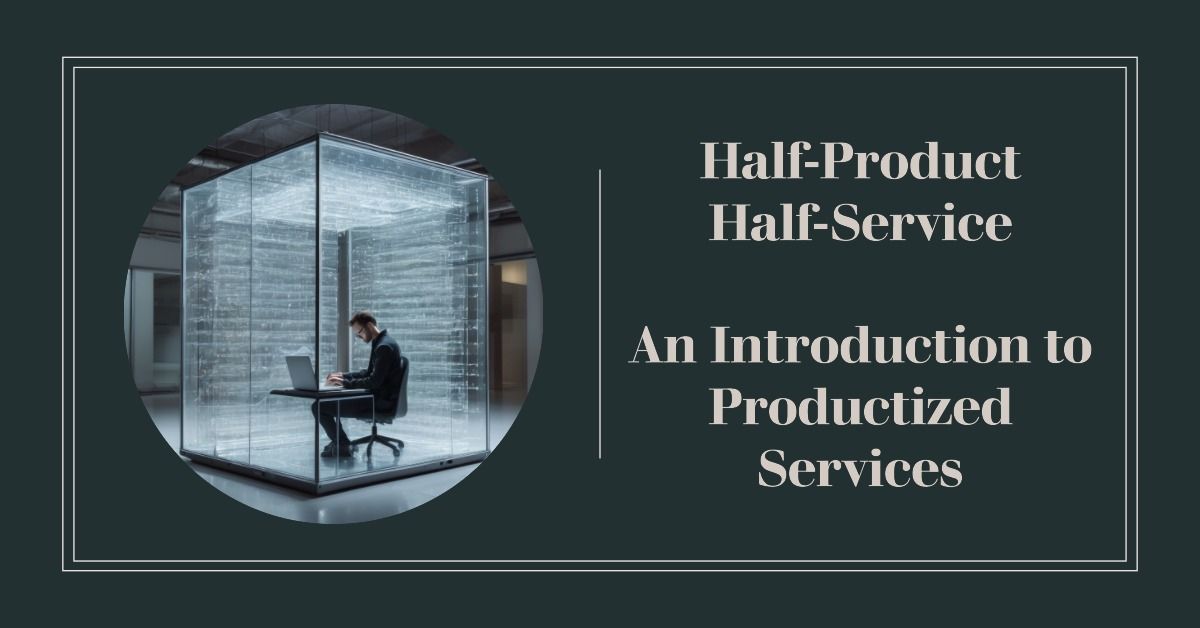Productized Services: Finding the Sweet Spot Between Products and Services
If you don't relish the thought of running sales meetings and writing proposals, productized services may be a good fit for you.

Typical Access consultants (myself included) tend to sell only highly-customized services to our clients.
But that's not the only way to monetize the act of software development. In fact, there are three main buckets:
- Products: fixed functionality and pricing (but challenging to do with Access)
- Services: highly customized but require more effort to design, price and deliver each project
- Productized Services: fixed price, repeatable, limited-scope engagements tweaked for each client
Productized services offer a middle ground that can be beneficial for both customers and providers. A productized service takes a common need and packages it in a standardized offering with predictable delivery and pricing. This provides more structure and efficiency than a custom service engagement, but allows for more flexibility than an "off-the-shelf" product.
Key Benefits
Some key benefits of productized services include:
Multiple Price Points
With productized services, you can offer different service packages at various price points to meet a range of budgets. This acts like a "product ladder" that allows customers to engage at the level that makes the most sense for their needs. Want just a basic implementation? No problem. Need additional customization or support? Higher price points have you covered.
Flexible Pricing
Since productized services have predefined deliverables and timelines, you have more control to adjust prices up or down based on supply and demand factors. Overwhelmed with demand from the market? Bump up the price. Available capacity sitting unused? Lower the price to juice demand.
Streamlined Sales Process
Customers understand exactly what they are getting for their investment. No meetings required to discuss ambiguous project scopes. They can self-screen and purchase online 24/7.
Efficiency Gains Over Time
By repeating the same packages, you (or your teams) get increasingly efficient at delivery. Processes, documentation and asset reuse improve with each completed engagement. This allows you to take on more work without a linear increase in workload.
Value-Based Pricing
Prices are tied to measurable customer value rather than your own costs and work hours. With defined outcomes, customers understand they are paying for business benefits. This shifts perceptions from cost to value. Packages are priced based on the quantified improvements and outcomes important to customers, creating a true win-win. Your success is directly aligned with customer success when prices correspond to the benefits they receive. This can allow higher profit margins than an hourly model.
Productized Service Examples for Access
For Access developers, common productized services could include things like:
- Database optimization reviews
- Migrations to newer versions
- Security assessments
- Custom form/report development packages
- Data integration tools (e.g., Excel exports or Power BI analysis)
- Back-end migrations from Access to SQL Server
Controlling for Scope
One thing to think about when designing a productized service is how to account for project scope.
One potential downside of a productized service is getting in over your head with a particular client situation. Migrating a back-end to SQL Server is a good example. One client might have a single back-end .accdb file with 10 tables, while another might have 75 password-protected back-end .mdb files with a total of 500 tables.
There are three immediate approaches that come to mind:
- Pricing explicitly for scope: for example, you could set a per-table price rather than a per-migration price (this protects you but it makes for a more complex buying decision)
- Trust the law of averages: accept that some engagements will be more profitable than others, but over time you'll have good margins (remember, you should also get more efficient at delivering the service over time)
- Protect yourself in the fine print: provide a terms and conditions document that addresses truly extreme cases (like my example above); do NOT use this as a "dark pattern" to try to hide expected charges from your customers, though, or no one will love you and your dog will die
Personally, I favor the second approach, though I would not be afraid to turn down a project and issue a full refund if there were major red flags.
My Own Experiment With Productized Services
This concept is something I've been thinking about for several years, but I finally made the plunge.
You may have noticed a new "Services" tab at the top of this site. That link takes you to a list of our current productized services. The list of services is short, but is likely to expand over time. Here's a brief description of each service as of publication:
- Access 911: provides urgent troubleshooting for critical Access issues
- Long-Term Support for Access: a service to provide ongoing maintenance for Access applications when the current developer leaves or retires
I'll try to check back in with everyone here as time goes by to let you know how this little experiment is going.
Reader Feedback
Have you sold any Microsoft Access-related productized services? Or pre-packaged "off-the-shelf" Access products? If so, let us know about it in the comments below. Be sure to include any tips for what works and what doesn't.
